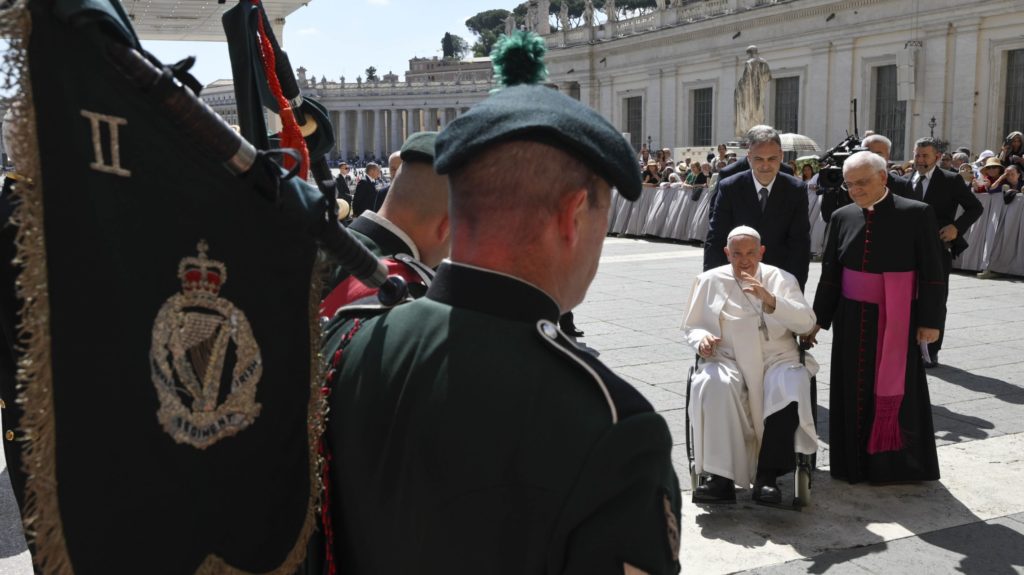Christians should read Scripture often, every day if possible, and look to the Spirit if reading the Gospel ever feels dry, Pope Francis said.
Even when one has repeatedly read a Scripture passage "without particular emotion," at the right time and in an atmosphere of faith and prayer ,"that text suddenly becomes illuminated, speaks to us, casts light on a problem we are experiencing, makes clear God's will for us in a certain situation," the pope said during his June 12 general audience.
"To what is this change due, if not an illumination of the Holy Spirit?" he asked. "The words of Scripture, under the action of the Spirit, become luminous."
To begin his audience, the pope rode into St. Peter's Square on the popemobile to the sound of bagpipes and drums played by the 38th (Irish) Brigade and the Royal Irish Regiment of the British army. The brigade visited the Vatican to mark the 80th anniversary of the liberation of Rome from Nazi occupation and its June 12, 1944, audience with Pope Pius XII.
Continuing his catechesis series on the Holy Spirit, Pope Francis reflected on the role of the Spirit in revelation, which he said not only inspired Scripture but "explains it and makes it eternally alive and active."
He said that the church "is nourished by reading Sacred Scripture, that is, reading done under the guidance of the Holy Spirit who inspired it."
At the center of the Gospel is the event of Christ's death and resurrection, the pope said, which "unveils all the hidden mysteries and offers the true key to the Bible."
"The death and resurrection of Christ is the light that illuminates the whole Bible and illuminates our life," he said.
Pope Francis encouraged Christians to dedicate time each day to the practice of "lectio divina," reading and meditating on the Gospel, and recommended they carry a pocket-sized copy of the Gospel with them to read in moments throughout the day.
Yet the best way to engage with the Gospel is through the liturgy, he said, in which "we see how an event or teaching given in the Old Testament finds its full realization in the Gospel of Christ."
Homilies are then meant to transfer the Gospel reading "from the book to life," the pope said, telling priests to keep their homilies under eight minutes.
"After that time, people lose attention, people fall asleep and they're right" to do so, he said. Pope Francis noted that priests often "talk so much and no one understands what they're talking about," and he encouraged them to communicate to their congregants a thought, a feeling and a proposal for concrete action in their homilies.
In Gospel passages read during Mass or in the Liturgy of the Hours there is always a word or message "intended especially for us," the pope said. "Embraced in our hearts, it can illuminate our day and animate our prayer. It is a matter of not letting it fall away."
In his greetings to visitors, Pope Francis asked for prayers for Ukraine, Palestine, Israel, Myanmar and the "many countries that are at war."
"War is always, from day one, a defeat," he said. "Let us pray for peace, that the Lord may give us strength to always fight for peace."

